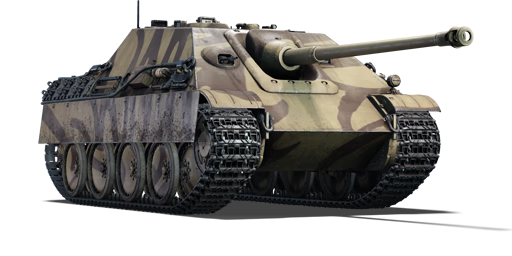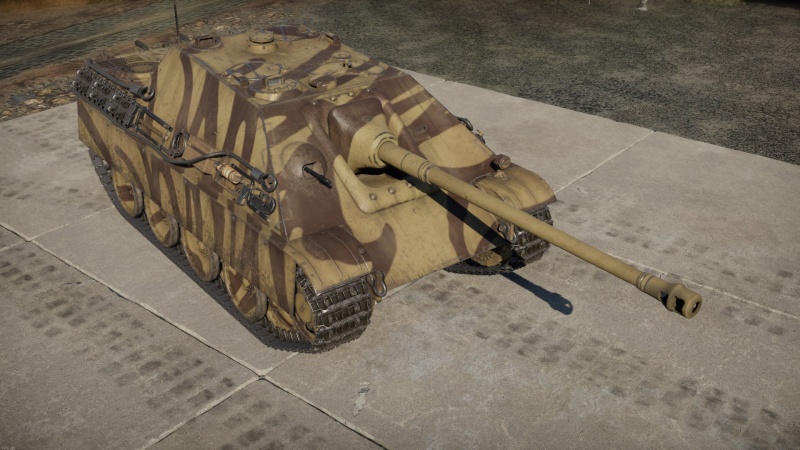Jagdpanther G1
| This page is about the tank destroyer Jagdpanther G1. For the premium version, see Bfw. Jagdpanther. For the other vehicles of the family, see Panther tank (Family). |
Contents
Descripour. Angling is ill-advised.
- Like most tank destroyers it lacks a turret. Coupled with the terrible reverse speed, getting flanked is almost always a death sentence.
- Despite the 5 men crew, the crew compartment is small. Any APHE shell that penetrates the armour will likely knock out all the crew in one shot.
- Despite not having a turret, it's still a big tank. Finding proper concealment can be a challenge.
- Roof armour is weak. Attackers and even some fighters machine guns can be lethal.
- The HEAT and HE rounds are completely useless while the APCR has mediocre penetration and damage potential. Don't bother taking anything but the default APCBC round into battle.
History
Development
Nazi Germany created the formidable 8.8 cm Pak 43 anti-tank gun, a longer version of the 8.8 cm Kwk 36. 2 attempts were made to fit this gun onto a self-propelled configuration, the first was Panzerjäger Tiger (P) Ferdinand (later Elefant) and the second was the Nashorn. However, the Ferdinand was too heavy and unreliable while the Nashorn was too small and underpowered to propel such a gun. The Jagdpanther was proposed in late 1942, as a tank destroyer from the Panther chassis that could mount the formidable 8.8 cm Pak 43 with good armour and speed. The tank destroyer was created and designated SdKfz 173 and was demonstrated to Hitler on October 1943. Production then started in January 1944 under the simpler name Jagdpanther by Hitler rather than using the longer 8.8 cm Pak 43/3 auf Panzerjäger Panther.
Throughout its production life of January 1944 to 1945, 415 total of these vehicles were made. MIAG produced 270 from January 1944 to the end of the war, MNH produced 112 from November 1944, and MBA produced 37 from December 1944. The supposed goal was 150 Jagdpanther produced a month, but Germany's deteriorating situation made this impossible. The Jagdpanthers were made in two variants, G1 and G2. The G1 had a small internally bolted main gun and modified Panther Ausf. An engine deck while the G2 had a larger simplified, outer bolted mantlet with a modified Panther Ausf. G engine deck. A proposal to mount the 12.8 cm Pak 80 was mentioned but never came around to production.
The Jagdpanther was a rather good design as a tank destroyer, it had a good power-to-weight ratio and had a gun that could destroy any Allied tank in service in the war. It did not suffer as much reliability problems due to being based on the later model Panther Ausf. G, which had most of the initial problems fixed. It also used an improved transmission and final drive (the two sources of most Panther issues) that was planned for the Panther II.
Combat Usage
Jagdpanthers were assigned to heavy tank destroyer battalions in the Western Front and Eastern Front, though most of the Jagdpanthers were sent to deal with the Soviet onslaught, where it first saw combat action. In Normandy, few of these vehicles were encountered by the Western Allies, though 12 were deployed in one occasion by the 654 schwere Panzerjäger-Abteilung against British units. One instance in July 30, 1944 saw three Jagdpanthers engage and destroy 10-11 Churchill tanks in about two minutes, though two of them were abandoned by the crew due to damage. The 654th was the only battalion to have a full complement of Jagdtigers of about 42 Jagdpanthers at the Western Front, the 559th battalion only had 10 to 14 of these vehicles. The largest concentration of the Jagdpanther on the west was during the Ardennes Offensive of about 20 vehicles combat-ready.
After the end of World War II with Nazi Germany's fall, the Jagdpanther and its original Panther configuration saw service with France. The Jagdpanthers served France from 1945 to the 1960s.
In-game description
One of the most powerful and most successful German tank destroyers of World War II. This tank destroyer was designed by the company MIAG and was based on the Pz.Kpfw. V Panther tank. From October 1943 to April 1945, the MIAG, MNH, and MBA factories produced a total of 413 Jagdpanthers.
The Jagdpanther was mass-produced in three variants which differed in the following ways.
The first variant was the early version of the G1 self-propelled gun, produced from January to September 1944. These vehicles had an 88 mm 8,8 cm Pak 43/2 gun with a one-piece barrel. The gun was fixed to the front armor with bolts inside the vehicle. Anti-magnetic Zimmerit paste was applied to the vehicle's vertical surface in its characteristic squares. Also, this variant lacked a snorkel. The plate covering the engine either completely lacked an opening or had an opening which was plugged closed.
The second variant was the standard G1, which had an 88 mm 8,8 cm Pak 43/3 gun with a composite barrel. This tank destroyer also received a new gun mantlet. Zimmerit was not applied. Heat shields were installed around the exhaust pipe, and the guide wheels had a larger diameter.
The third variant was the G2, which was equipped with a new gun mantlet reinforced with bolts. An armored plate taken from the Pz.Kpfw. V Ausf. G Panther tank was installed over the engine. The trenching tool and cleaning rod tube was moved to the rear.
This tank destroyer was a very effective weapon against all types of Soviet and Allied tanks. It was used on the Western and Eastern fronts until the end of the war.
For a heavy vehicle, the Jagdpanther had good speed and maneuverability. On the other hand, this self-propelled vehicle inherited a number of disadvantages from the tank it was based on, primarily low mechanical reliability and relatively thin side armor.
Media
- Skins
- Videos
See also
External links
| Germany tank destroyers | |
|---|---|
| Pz. I Derivatives | Panzerjäger I |
| Pz. II Derivatives | 15cm sIG 33 B Sfl |
| Pz. 38(t) Derivatives | Marder III · Marder III H · Jagdpanzer 38(t) |
| Pz. III Derivatives | StuG III A · StuG III F · StuG III G · StuH 42 G |
| Pz. IV Derivatives | Jagdpanzer IV · Panzer IV/70(A) · Panzer IV/70(V) · Dicker Max · Nashorn · Brummbär · VFW |
| Pz. V Derivatives | Jagdpanther G1 · Bfw. Jagdpanther G1 |
| Pz. VI Derivatives | Sturer Emil · Elefant · Ferdinand · 38 cm Sturmmörser · Jagdtiger |
| Wheeled/Half-track | 8,8 cm Flak 37 Sfl. · Sd.Kfz.251/9 · Sd.Kfz.251/10 · Sd.Kfz.251/22 · Sd.Kfz.234/3 · Sd.Kfz.234/4 · 15 cm Pz.W.42 |
| ATGM Carrier | RakJPz 2 · RakJPz 2 (HOT) · Wiesel 1A2 |
| Other | Waffenträger · M109G · JPz 4-5 · Raketenautomat · VT1-2 |





